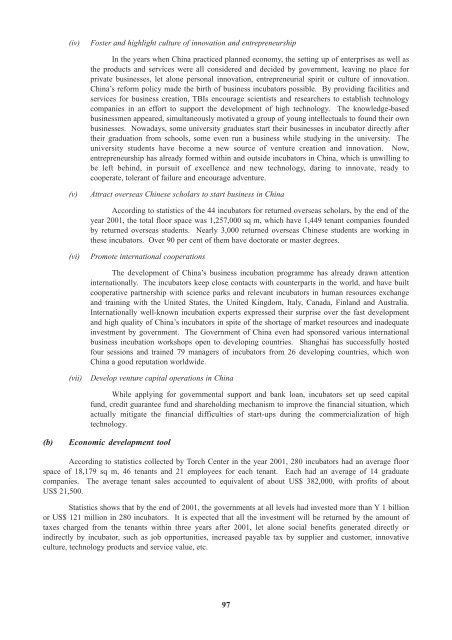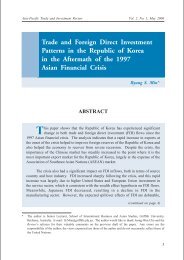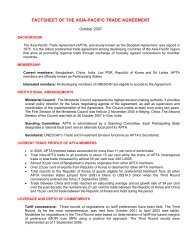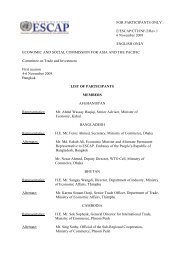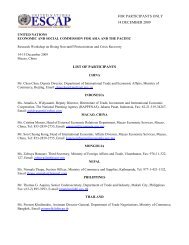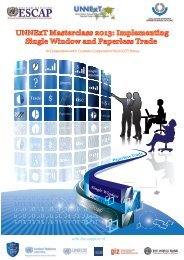iii. promoting business and technology incubation for ... - Escap
iii. promoting business and technology incubation for ... - Escap
iii. promoting business and technology incubation for ... - Escap
You also want an ePaper? Increase the reach of your titles
YUMPU automatically turns print PDFs into web optimized ePapers that Google loves.
(iv)<br />
Foster <strong>and</strong> highlight culture of innovation <strong>and</strong> entrepreneurship<br />
In the years when China practiced planned economy, the setting up of enterprises as well as<br />
the products <strong>and</strong> services were all considered <strong>and</strong> decided by government, leaving no place <strong>for</strong><br />
private <strong>business</strong>es, let alone personal innovation, entrepreneurial spirit or culture of innovation.<br />
China’s re<strong>for</strong>m policy made the birth of <strong>business</strong> incubators possible. By providing facilities <strong>and</strong><br />
services <strong>for</strong> <strong>business</strong> creation, TBIs encourage scientists <strong>and</strong> researchers to establish <strong>technology</strong><br />
companies in an ef<strong>for</strong>t to support the development of high <strong>technology</strong>. The knowledge-based<br />
<strong>business</strong>men appeared, simultaneously motivated a group of young intellectuals to found their own<br />
<strong>business</strong>es. Nowadays, some university graduates start their <strong>business</strong>es in incubator directly after<br />
their graduation from schools, some even run a <strong>business</strong> while studying in the university. The<br />
university students have become a new source of venture creation <strong>and</strong> innovation. Now,<br />
entrepreneurship has already <strong>for</strong>med within <strong>and</strong> outside incubators in China, which is unwilling to<br />
be left behind, in pursuit of excellence <strong>and</strong> new <strong>technology</strong>, daring to innovate, ready to<br />
cooperate, tolerant of failure <strong>and</strong> encourage adventure.<br />
(v)<br />
Attract overseas Chinese scholars to start <strong>business</strong> in China<br />
According to statistics of the 44 incubators <strong>for</strong> returned overseas scholars, by the end of the<br />
year 2001, the total floor space was 1,257,000 sq m, which have 1,449 tenant companies founded<br />
by returned overseas students. Nearly 3,000 returned overseas Chinese students are working in<br />
these incubators. Over 90 per cent of them have doctorate or master degrees.<br />
(vi)<br />
Promote international cooperations<br />
The development of China’s <strong>business</strong> <strong>incubation</strong> programme has already drawn attention<br />
internationally. The incubators keep close contacts with counterparts in the world, <strong>and</strong> have built<br />
cooperative partnership with science parks <strong>and</strong> relevant incubators in human resources exchange<br />
<strong>and</strong> training with the United States, the United Kingdom, Italy, Canada, Finl<strong>and</strong> <strong>and</strong> Australia.<br />
Internationally well-known <strong>incubation</strong> experts expressed their surprise over the fast development<br />
<strong>and</strong> high quality of China’s incubators in spite of the shortage of market resources <strong>and</strong> inadequate<br />
investment by government. The Government of China even had sponsored various international<br />
<strong>business</strong> <strong>incubation</strong> workshops open to developing countries. Shanghai has successfully hosted<br />
four sessions <strong>and</strong> trained 79 managers of incubators from 26 developing countries, which won<br />
China a good reputation worldwide.<br />
(vii)<br />
Develop venture capital operations in China<br />
While applying <strong>for</strong> governmental support <strong>and</strong> bank loan, incubators set up seed capital<br />
fund, credit guarantee fund <strong>and</strong> shareholding mechanism to improve the financial situation, which<br />
actually mitigate the financial difficulties of start-ups during the commercialization of high<br />
<strong>technology</strong>.<br />
(b)<br />
Economic development tool<br />
According to statistics collected by Torch Center in the year 2001, 280 incubators had an average floor<br />
space of 18,179 sq m, 46 tenants <strong>and</strong> 21 employees <strong>for</strong> each tenant. Each had an average of 14 graduate<br />
companies. The average tenant sales accounted to equivalent of about US$ 382,000, with profits of about<br />
US$ 21,500.<br />
Statistics shows that by the end of 2001, the governments at all levels had invested more than Y 1 billion<br />
or US$ 121 million in 280 incubators. It is expected that all the investment will be returned by the amount of<br />
taxes charged from the tenants within three years after 2001, let alone social benefits generated directly or<br />
indirectly by incubator, such as job opportunities, increased payable tax by supplier <strong>and</strong> customer, innovative<br />
culture, <strong>technology</strong> products <strong>and</strong> service value, etc.<br />
97


